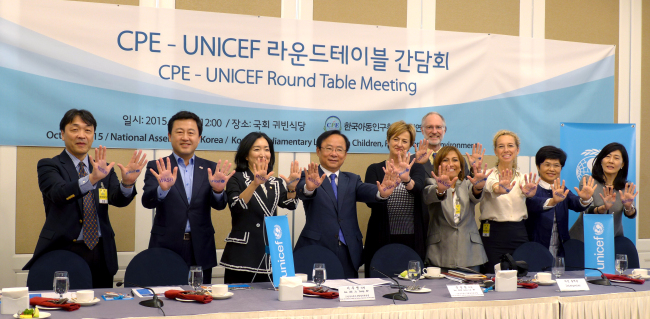Syria is a killing field. The conflict that erupted 5 years ago between the people and President Bashar al-Assad’s regime has left over 250,000 people dead and uprooted 12 million more.
To survive what has become the world’s largest humanitarian crisis, over 5 million children need food, water and shelter before the winter.
A delegation from the United Nations Children’s Fund visited Korea last week to secure much-needed support from the government, companies and citizens.
To survive what has become the world’s largest humanitarian crisis, over 5 million children need food, water and shelter before the winter.
A delegation from the United Nations Children’s Fund visited Korea last week to secure much-needed support from the government, companies and citizens.

“Over the last few months, the world shared grief over the plight of Middle Eastern and North African refugees, particularly the dead 3-year-old Syrian toddler Aylan Kurdi on a Turkish beach,” Yoka Brandt, the UNICEF deputy executive director, told the National Assembly members on Oct. 19.
The waves of refugees into Europe, projected to reach 900,000 by next year, are merely the tip of the iceberg, she claimed, as 12 million people are dislocated in and around Syria.
Behind these numbers, “people have terrible stories to tell ― witnessing and being victims of unimaginable violence, losing family, starving and being deprived of education,” according to her.
As of now, 2 million children in Syria are out of school, as 1 out of 4 schools was destroyed and 50,000 teachers were either killed or displaced. Only 1 in 3 hospitals is still open.
“Given the lack of water and basic services,” she added, “the perils of the coming winter will most negatively affect children.”
To help relieve the crises, exacerbated by intensifying American and Russian air strikes, UNICEF says it needs $14 million in aid, of which $6.5 million would be used in the next 6 months.

The Korean government, working with the Ministry of Foreign Affairs, the Ministry of Unification and the Korea International Cooperation Agency, contributed around $25 million separately in 2013 and 2014. The Korean Committee for UNICEF last year raised $88 million from individuals, firms and foundations.
Hanna Singer, UNICEF Syria representative, emphasized that the water supply in Syria had halved since the conflict began, and diseases such as polio, hepatitis A and typhoid have resurfaced.
“Water is being used as a weapon by armed opposition groups,” she lamented, noting that water was unavailable for 41 straight days in summer to the detriment of 2.1 million people in Aleppo.
UNICEF adopts dual approaches to administer water, sanitation and hygiene services, dubbed “WASH.”
The first objective aims at trucking 10 million liters of water and disinfectant daily, and the second objective works to enhance resilience by rehabilitating groundwater wells and supply networks.
“Our motto is to stay and deliver, despite the mortal dangers,” Singer said, mentioning her late colleague Mohammed Khalaf, who was killed two weeks ago in Raqqa delivering immunization services. “I pay tribute to him through this work.”
Joel Lee (joel@heraldcorp.com)

-
Articles by Korea Herald




![[Weekender] Korean psyche untangled: Musok](http://res.heraldm.com/phpwas/restmb_idxmake.php?idx=644&simg=/content/image/2024/05/02/20240502050841_0.jpg&u=)

![[Eye Interview] 'If you live to 100, you might as well be happy,' says 88-year-old bestselling essayist](http://res.heraldm.com/phpwas/restmb_idxmake.php?idx=644&simg=/content/image/2024/05/03/20240503050674_0.jpg&u=)











![[Herald Interview] Director of 'Goodbye Earth' aimed to ask how we would face apocalypse](http://res.heraldm.com/phpwas/restmb_idxmake.php?idx=652&simg=/content/image/2024/05/03/20240503050732_0.jpg&u=)
